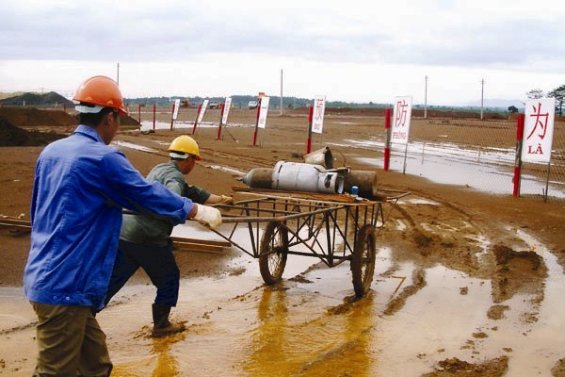
| Vietnam warned about the “erodent investment wave” from China | |
China has never been listed among the biggest foreign investors in Vietnam. However, it has always been a special noteworthy investor. Japan continues topping the list of foreign direct investors in Vietnam with the total registered investment capital of $33.4 billion by the end of 2013. It has been followed by Singapore ($28.8 billion), Taiwan ($27.49 billion) and South Korea ($24.3 billion). China is not found in the list of the top 10 foreign investors in Vietnam. However, a report from the Foreign Investment Agency showed that the Chinese FDI capital in Vietnam soared unexpectedly in 2013 to $2.3 billion from $345 million in 2012. Analysts have pointed out that the Chinese capital has been targeting some specific “goals.” A high proportion of capital has been flowing into textile and garment industry, where the Vietnamese enterprises’ competitiveness remains weak. The Chinese capital has also been injected in the Vietnamese real estate sector, which shows big management problems and is in the setback period, in the mining industry, which is a “sensitive” field, and in the processing industry which cannot create high added value. They have also commented that Chinese target the construction and infrastructure development, the land of dubious and tortuous bids. Scholars and economists have many times expressed their big worries about the fact that Chinese won 90 percent of the bids for the national key construction projects. The worries about the Chinese erodent investment have become even bigger as local newspapers have recently reported about the “Chinese villages” in many localities of Vietnam, including Ha Tinh, Binh Duong and Dak Nong provinces. The Chinese residential quarters have taken shape during the implementation of the construction projects undertaken by Chinese enterprises. However, the towns still exist in Vietnam even though the construction works have finished. The economists have every reason to feel worried that the localities may lead to the establishment of the “Chinese town” like Cho Lon in HCM City in the past. A report from CBRE, a real estate service provider, showed that Chinese investors are targeting the resort & entertainment complex projects in the central provinces. China is not a member of the Trans Pacific Agreement (TPP), but Chinese have been hurrying to set up textile and garment factories in Vietnam to take full advantage of the opportunities to be brought by TPP. Chinese have spent more and more money to buy Vietnamese businesses, which are now in big difficulties due to the lack of capital. Gaoling, a Chinese investment fund late last year spent $40 million to buy a big amount of Vinacafe Bien Hoa to become the second biggest shareholder of the coffee manufacturer. Vietnam, when trying to attract FDI, aims to three goals 1) attracting foreign capital and advanced technologies 2) learning the foreign management skills to upgrade Vietnamese qualifications 3) creating more jobs. Meanwhile, the Chinese investments cannot bring anything good to Vietnam except the capital. Especially, Chinese investments do not help create jobs to local laborers, because Chinese enterprises bring Chinese laborers to Vietnam to implement the projects. A market economy must perform under its rules. However, it must also be managed by the framework set to protect the national sovereignty. | |
| TBKTSG |
